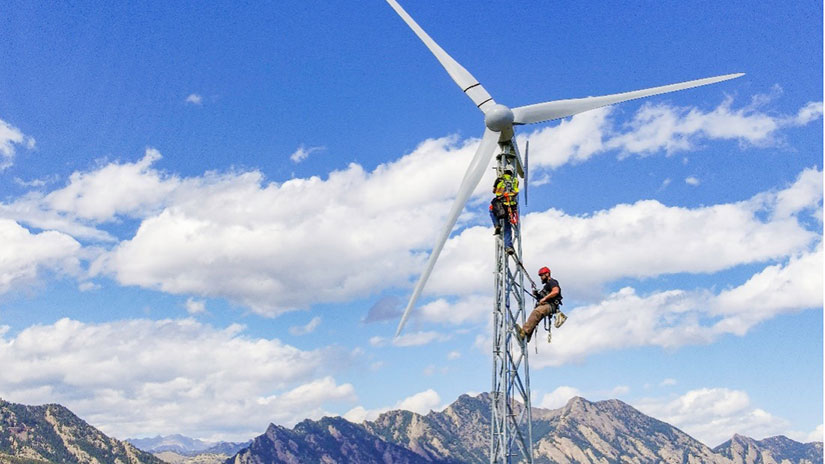NREL Requests Proposals From US Manufacturers of Small and Medium Wind Turbine Technology
Competitiveness Improvement Project 2024 Funding Focuses on Bringing Technology to Market

The U.S. Department of Energy’s (DOE’s) National Renewable Energy Laboratory (NREL) has issued a request for proposals (RFP) under the Competitiveness Improvement Project (CIP) to support commercialization and market expansion of small and medium wind turbine technology.
New in 2024 is a focus on commercialization plans and business models that support cost savings and revenue generation for rural small businesses and farmers in support of the U.S. Department of Agriculture and DOE’s new Rural and Agricultural Income & Savings from Renewable Energy (RAISE) Initiative. Proposals will be accepted through 2 p.m. MT on March 27, 2024.
Managed by NREL on behalf of DOE’s Wind Energy Technologies Office, CIP awards cost-shared subcontracts and national laboratory technical support to U.S. component suppliers and manufacturers of small- and medium-sized wind turbines.
Advancing small and medium wind energy systems to commercialization is technically challenging and resource intensive for small businesses, which often lack the capacity to develop, certify, and commercialize their technologies.
Take Windward Engineering, for example. This small company based in Spanish Fork, Utah, has received two CIP awards. The first award helped Windward Engineering develop the design of its 60-kilowatt Zephyr 21/60 wind turbine. In 2022, a CIP award made it possible for the company to perform prototype testing of the Zephyr turbine in preparation for certification and entry into the distributed wind market.
“Prototype testing is costly and challenging for small businesses,” said Dean Davis, president of Windward Engineering. “The support of the CIP program is crucial to thoroughly test the Zephyr 21/60’s new full-span pitch system for function, performance, and load reduction as we move toward production.”
Focused on Current Market Needs
The CIP 2024 RFP reflects the current needs of the U.S. distributed wind energy market by prioritizing topics that:
- Provide distributed energy consumers with wind energy technology options that are tested and certified for performance and quality
- Support distributed wind energy technology commercialization with a focus on business models that benefit rural small businesses and farmers
- Address the need for inverters built specifically for distributed wind turbines and that have achieved listing to national safety standards
- Develop advanced manufacturing processes to reduce hardware costs and meet growing demand.
“CIP funding in 2024 responds to what the distributed wind market needs—distributed wind energy components and turbines that are tested, certified, and commercialized,” said Brent Summerville, NREL distributed wind energy researcher and CIP program lead. “We’re helping companies get across the finish line to deployment, which supports national clean energy goals and benefits rural communities.”
CIP has also added a new topic area for 2024—Inverter Listing. Previously embedded in the Small Wind Certification topic area, inverters will now have a standalone topic area that provides a clearer path to address the urgent need for inverters built specifically for distributed wind turbines and that have achieved listing to U.S. inverter standards and requirements.
In response to feedback provided by industry members during workshops held in 2023, NREL offered potential CIP applicants the opportunity to submit concept papers detailing their ideas prior to the RFP release.
“Concept papers enabled NREL to provide prompt feedback to applicants on their ideas,” Summerville said. “This step not only gives NREL a way to provide feedback to potential applicants, but also gives us insight into what industry is thinking.”
Topic Areas
The 2024 CIP RFP invites proposals that focus on six topic areas. They are:
- Prototype Installation and Testing, for projects validating prototype wind turbines to determine their commercial readiness
- Small Turbine Certification and/or Listing, for projects helping small (150 kilowatts or less) wind turbines achieve certification and turbine assembly or components achieve listing to applicable electrical safety standards
- Type Certification and Listing, for projects helping turbines up to 1 megawatt seek type certification and turbine assembly or components achieve listing to applicable electrical safety standards
- (New) Inverter Listing, for projects addressing the need for inverters built specifically for wind turbines up to 1 megawatt and that have achieved listing to national safety standards
- Manufacturing Process Innovation, for projects supporting designing, building, and validating improved manufacturing processes for wind turbine production, leading to reduced energy costs
- Product Commercialization and Market Development, for projects addressing cost barriers to commercialization and large-scale development.
The 2024 RFP includes cost-share requirements, and proposals must provide evidence of technical readiness, incorporation in the United States, strong team skills and capabilities, and financial information. Work funded under this effort is expected to take place in the United States and/or U.S. territories unless otherwise justified.
Competitiveness Improvement Project
Since 2012, NREL has awarded:
private-sector investment
The Competitiveness Improvement Project supports companies from across the nation.

The Competitiveness Improvement Project provides subcontracts to U.S. companies that help make distributed wind energy more cost competitive. Graphic by John Frenzl, NREL
Project Impact
Since CIP began in 2012, NREL has awarded 64 subcontracts to 26 companies, totaling $15.4 million of DOE funding and leveraging $7.9 million in additional private-sector investment.
“Over 12 years, CIP has been instrumental in advancing wind energy as a low-cost distributed generation technology option, supporting new product innovation, and ensuring the performance and quality of these technologies for distributed wind energy consumers,” Summerville said. “What the market needs right now are certified turbines ready for deployment, and that’s what the CIP 2024 funding round is designed to do.”
To view the CIP RFP and read more information about CIP, including examples of past awards and information presented in a November 2023 webinar, visit the CIP project website. Learn more about NREL's distributed wind energy research, and subscribe to NREL's wind energy newsletter for more news like this.
Last Updated May 28, 2025
